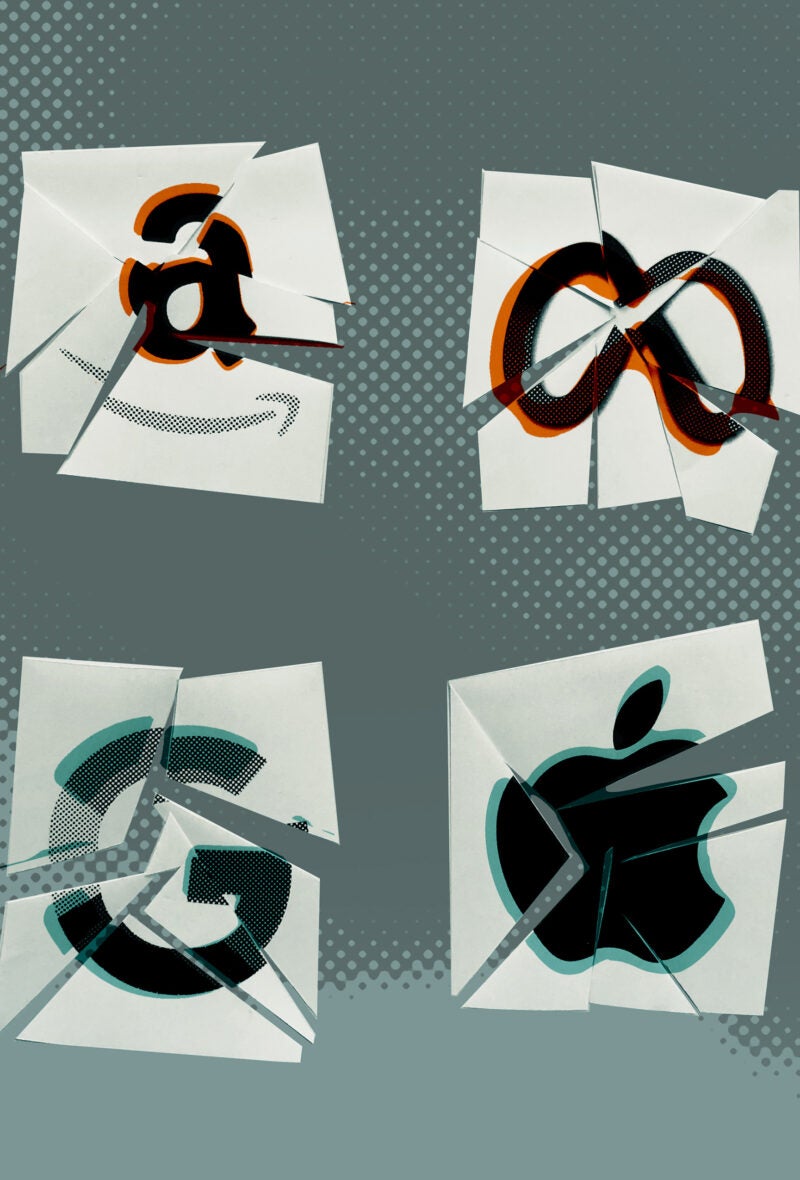When Timothy Wu ’98 first learned this spring that the Harvard Law Bulletin was writing about the current wave of antitrust lawsuits against Big Tech, he was delighted — and a bit surprised.

The aggressive new crackdown on four internet giants, which Wu helped engineer, has received insufficient coverage in the media, he believes, considering its potential impact on consumer prices, wealth inequality, the development of artificial intelligence, and even the health of American democracy.
“I deeply appreciate you paying attention to these questions. I think they can be kind of swept aside,” says Wu, a former federal official who has helped spur this renaissance of antitrust enforcement actions. While other social and political issues are taking center stage at the moment, “I think these fundamental economic questions matter more in the long run,” says Wu, a professor at Columbia Law School.
After a long dry spell in antitrust prosecution — the last major case was against Microsoft in the late 1990s — the federal government is suing Apple, Amazon, Meta (Facebook’s parent company), and Google for allegedly constructing illegal monopolies that harm consumers and choke innovation. The companies deny the allegations and have been defending themselves vigorously. But in August, in the first case to go to trial, Judge Amit P. Mehta of U.S. District Court for the District of Columbia ruled that Google maintained an illegal monopoly in online search. It’s a landmark decision that could influence the other lawsuits, including a second case against Google alleging it has an illegal monopoly in online advertising, which went to trial in September.
According to Wu, this wave of litigation marks a return to the origins of antitrust law, and a possible end to the dominance over the past 40 years of the Chicago school, an economic theory championed by its well-known proponents Milton Friedman and Robert Bork. In the antitrust realm, the Chicago school argues that if prices are low, and markets are efficient and offer many products, consumers are protected even when monopolies prevail. Due in part to heavy lobbying by well-funded interest groups, this “consumer welfare” approach grew in popularity among judges and regulators from the late 1970s on, explains John Coates, the John F. Cogan, Jr. Professor of Law and Economics at Harvard Law School.

Unparalleled network effects
But the network features of online tech companies were unimaginable when the Chicago school gained prominence, let alone when antitrust law first developed with the passage of the Sherman Antitrust Act of 1890 and the Clayton Act of 1914, and the creation of the Federal Trade Commission in 1914, all designed to outlaw unfair competition and curb the power of railroad, steel, and other monopolies.
A social media platform like Facebook is inherently more valuable the more people who use it, so there’s enormous incentive to corner the market. “Built into the very nature of the product is a form of economies of scale that makes it very difficult for others to compete,” Coates explains. The Chicago school’s “overall framework had nothing to say about networks. It views markets independently … and didn’t think about the way in which the network features of a service or device would provide barriers to entry that are different from traditional ones.”
“At a very high level, the Biden administration is the first administration to take that seriously,” Coates says. “That’s why these cases are happening now.”
The lawsuits are driven by concerns about wealth inequality, limited consumer choice, privacy risks, and the stifling of competition in the digital marketplace.
It’s almost impossible to imagine society today without the internet. For buying and selling goods and services, and for accessing the vast accumulated wealth of human knowledge — from the works of Plato to the best way to decorate a child’s birthday cake — parents, hospitals, schools, governments, private businesses, and individuals around the world rely on internet access that’s affordable, competitive, and widely available.
While the Big Tech companies play a central role in providing the infrastructure for this digital marketplace, over the past 15 to 20 years the online economy has become controlled by a handful that function as “gatekeepers” that dictate how goods, services, and information are distributed, according to a 2020 report, “Investigation of Competition in Digital Markets,” by the House Committee on the Judiciary, through its Subcommittee on Antitrust, Commercial and Administrative Law.
“Over the past decade, the digital economy has become highly concentrated and prone to monopolization,” the subcommittee found. Big companies have acquired hundreds of smaller ones, including potential competitors — in some cases to simply shut them down. As a result, creativity and entrepreneurship are squelched, consumer product choice is limited, privacy is endangered, and the media is less robust and less diverse, the report states.
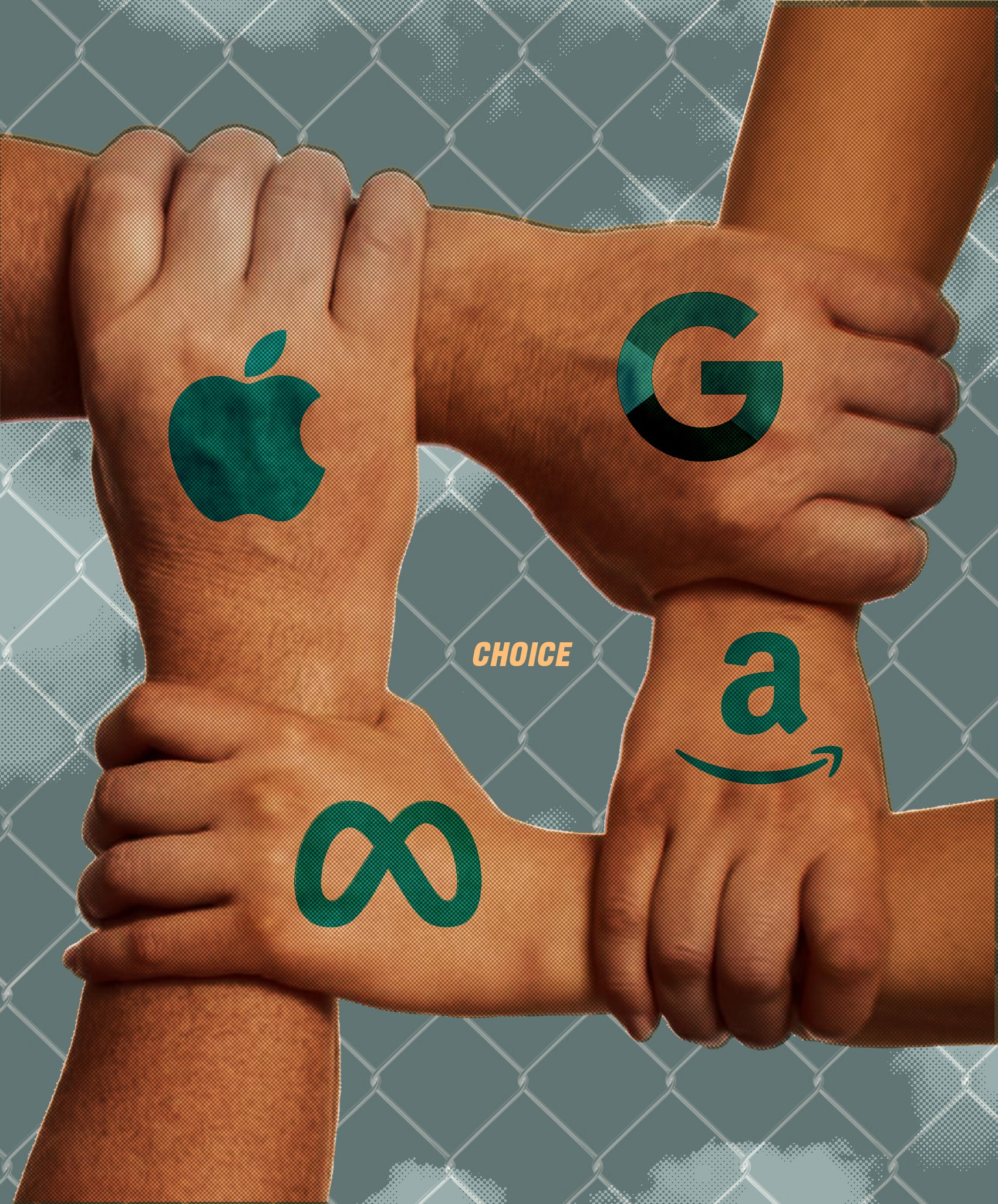
Oil barons of a new Gilded Age?
Moreover, the most successful online brands can accumulate massive amounts of data about consumer preferences, which they can use to continuously improve their own products, promote themselves over other companies, and squeeze out newcomers, critics maintain. According to the pending FTC lawsuit, Amazon, the once novel and niche online bookseller, has grown into a huge illegal monopoly by boosting its own products over competitors’ in its online marketplace, promoting its products in ways that are sometimes hard to recognize as ads, and effectively blocking retailers who use its site from selling their products cheaper elsewhere.
“To put it simply, companies that were once scrappy, underdog start-ups that challenged the status quo have become the kinds of monopolies we last saw in the era of oil barons and railroad tycoons,” according to the House report.
Fifteen years ago, attempts to rein in the market power of Big Tech faltered, but there’s a different attitude now, says Elettra Bietti LL.M. ’12 S.J.D. ’22, a faculty associate at Harvard’s Berkman Klein Center for Internet & Society and an assistant professor at Northeastern University School of Law. “It’s very clear these actors have a lot of power over our lives,” she says, which has spurred “an appetite for new solutions.”
In 2017, while still a student at Yale Law School, Lina Khan — now chair of the Federal Trade Commission — wrote a groundbreaking article, “Amazon’s Antitrust Paradox,” that shook up antitrust thinking. Khan argued that Big Tech has such enormous power over every aspect of our lives that the Chicago school analysis is outdated and harmful.
Companies like Amazon, which now controls nearly 40% of sales in the U.S., have been compared to the kind of monopolies seen in the era of the oil barons.
Khan, Wu, and other so-called New Brandeisians follow the economic philosophy of the early 20th-century U.S. Supreme Court Justice Louis Brandeis LL.B. 1877, who saw monopolies and concentrated private power as dangerous to economic and political stability. Khan’s article “argued that by taking efficiency or consumer welfare as the primary standard for whether or not to pursue an antitrust case, we were letting a company like Amazon basically operate unchecked in ways that actually hampered market dynamics,” explains Bietti, “because, structurally, we were allowing one player to take over the entire economy.”
The article went, well, viral. “And after that,” Bietti adds, “a lot of things happened.”
Wealth inequality and the rise of the New Brandeisians
Although the lawsuits are new, the issues driving them have been percolating for years. During the later years of the administration of President Barack Obama ’91, economics officials and expert observers began to express a growing concern about the power of Big Tech and how it contributed to wealth inequality, says Wu, who served as a senior adviser at the Federal Trade Commission and as a National Economic Council official at that time.
“Antitrust law, in a way, was born almost as a companion to the Constitution. In the sense that the Constitution is a check on public power, the antitrust laws are a backstop or a limit on corporate and private power,” says Wu, adding that they were very aggressively enforced “over the early 20th century, resulting in the breakup of most of the major monopolies in the U.S. economy at that time,” including Standard Oil and the American Tobacco Co.
More than a century after the Supreme Court ordered Standard Oil to be split into 34 different entities, several tech giants have cornered various aspects of the online market. For instance, Meta dominates social media, according to the FTC lawsuit against it. Google controls 90% of the internet search business in the U.S. In a survey of 2,000 consumers last year, 75% of respondents indicated they check prices and product reviews on Amazon before making a purchase. And in addition to its many other products and services, Apple led all other producers in global smartphone sales last year.
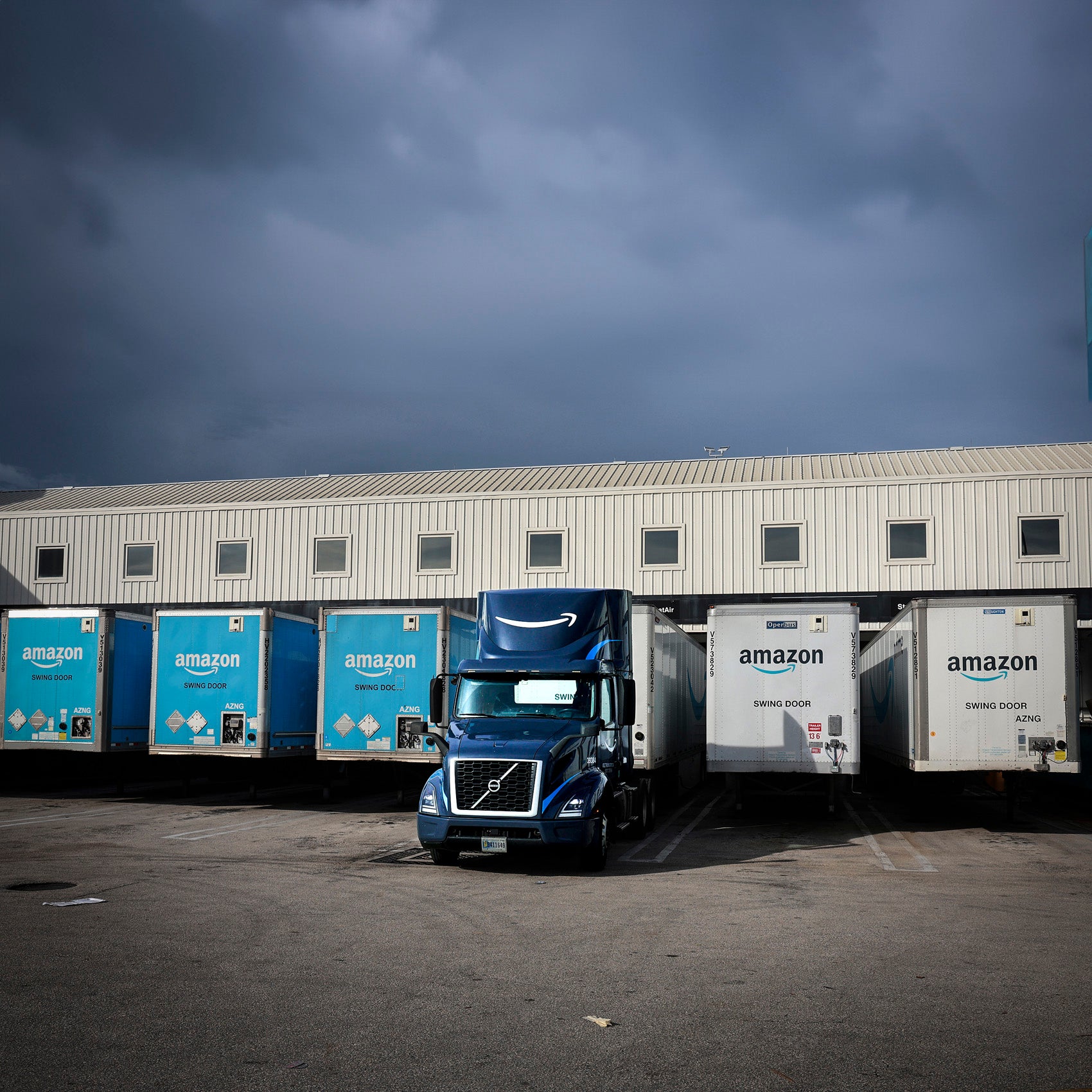
Critics contend that this situation, a dream scenario for the four tech giants, is a nightmare for shoppers. The companies are fiercely defending themselves, arguing that they are not violating antitrust laws, that they invest in innovation that benefits consumers, and that they are not stifling competition. Amazon, for one, calls the antitrust lawsuit against it a “fundamental misunderstanding of retail” and warns that if the FTC wins, product prices may rise and its popular Prime shipping option may be slower and more expensive.
Yet, according to Wu, “It’s clear that they’re holding back innovation that could benefit consumers. Amazon began as the price cutter but now seems to be preventing people from getting cheaper prices on other platforms, which contributes to inflation. A company like Apple is doing a good job of preventing rival luxury phones from being legitimate competitors.”
In that way, “I think we’ve replicated some of the conditions of the Gilded Age,” says Wu, whose 2018 book, “The Curse of Bigness: Antitrust in the New Gilded Age,” argues that today’s rise of populism and strongman politicians can be traced to the rise of concentrated corporate power and resulting wealth disparities. “By no coincidence, we’ve also seen a replication of this sense of unfairness and inequality,” Wu adds. Within the Obama White House, “We started to think that the antitrust law had just gone way too far in one direction.”
The Trump administration, too, was skeptical of Big Tech market dominance. In 2019, it launched antitrust investigations against Apple, Amazon, Google, and Meta. When Biden was elected in 2020, his administration took an even more aggressive stance. He appointed Wu as special assistant to the president for technology and competition policy; appointed Khan as chair of the FTC; and tapped Jonathan Kanter, another New Brandeisian, to head the antitrust division of the Department of Justice.
In the past several years, the FTC and DOJ, along with many state attorneys general, have filed five lawsuits against the four tech giants on different claims of antitrust violations (see sidebar). While they are “good companies” that have made positive contributions, Wu says, “they’ve been around for a while.” The Biden administration believes that “shaking up tech could be important and essential to our leadership in technology, in the tech industries globally,” he adds, through an effort “to prune the giant tree so that small things can grow.”
The twin goals are fostering innovation, so that the U.S. maintains a competitive advantage in global markets, and lowering prices through healthy competition. Unlike many other examples of government regulation, the cases against Big Tech enjoy bipartisan support, Wu emphasizes, including from Republican state attorneys general. “In some ways, the red states are even more intense about this campaign,” he adds.
Given how much power leading tech companies have over every aspect of modern life — including access to massive amounts of private information — it’s unsurprising that most Americans express concern about them, according to polls.
“One way to understand this new movement in antitrust is to see it as a check on the power of private companies to control our economy,” says Bietti, “and, more broadly, life in the 21st century.”
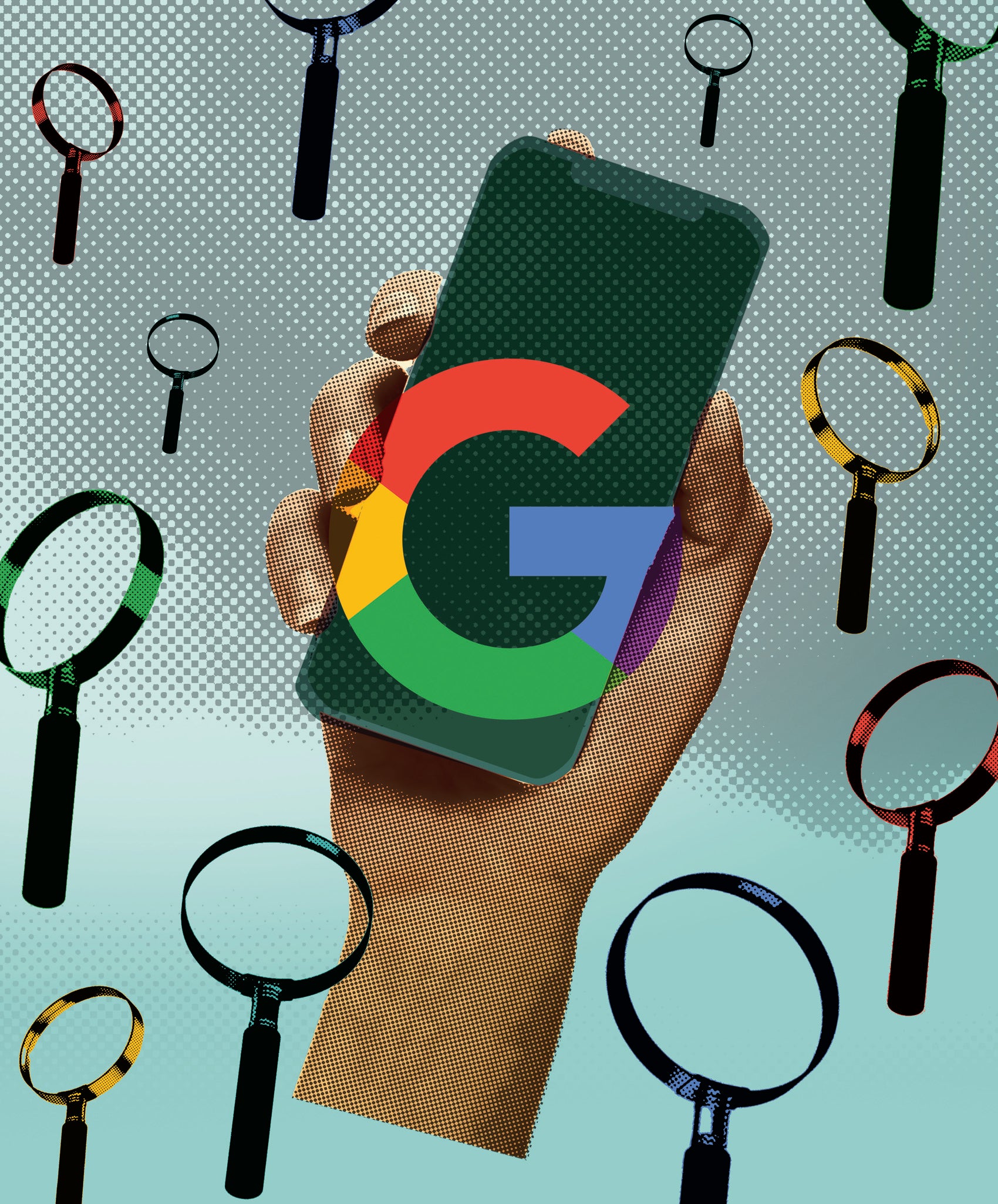
The battle to dominate in AI
The AI revolution is revolutionizing our lives, for better or worse. Today’s antitrust lawsuits offer hints regarding who will dominate in the burgeoning field and what’s coming next, Wu says.
“What you find about big antitrust suits is that while everybody’s fighting about one thing at the time, the effects tend to be for the future,” he says. The most important consequence of the antitrust case against AT&T and its national monopoly over telephone service, which resulted in the company’s breakup in 1984, “was opening up the markets for companies that ended up being the first internet providers,” which “ended up being way more important over the long run” than the government’s original goal: lowering the cost of long-distance phone calls.
In the same way, today’s battles over search engine dominance or Amazon’s online platform are a peek into the future. “Ten or 15 years from now, we’ll realize it was all about who’s going to control artificial intelligence,” Wu says, “and whether you make room for a new generation of actors, or whether Google and Microsoft just get to take over AI.”
Given that Google paid Apple $18 billion in 2021 to make Google the default search engine on Apple products, even a fellow behemoth like Microsoft can’t compete.
This was clear in the Google search engine bench trial, decided in August. During the trial, Microsoft CEO Satya Nadella testified that the breathtaking trove of consumer data that Google amasses through its dominant search engine enables it to train its AI models to perform better than anyone else’s.
In January, the FTC launched an investigation into five corporations — including Google’s parent company, Alphabet; Amazon; and Microsoft — regarding their investments in and partnerships with generative AI companies and cloud service providers. In an interview in February with Harvard Law Today, FTC Chair Khan said that the AI space “is so fast moving. And so, we really want to make sure that the opportunity for competition and the potential for disruption are preserved, rather than this moment being co-opted by some of the existing dominant firms to double down on their dominance.”
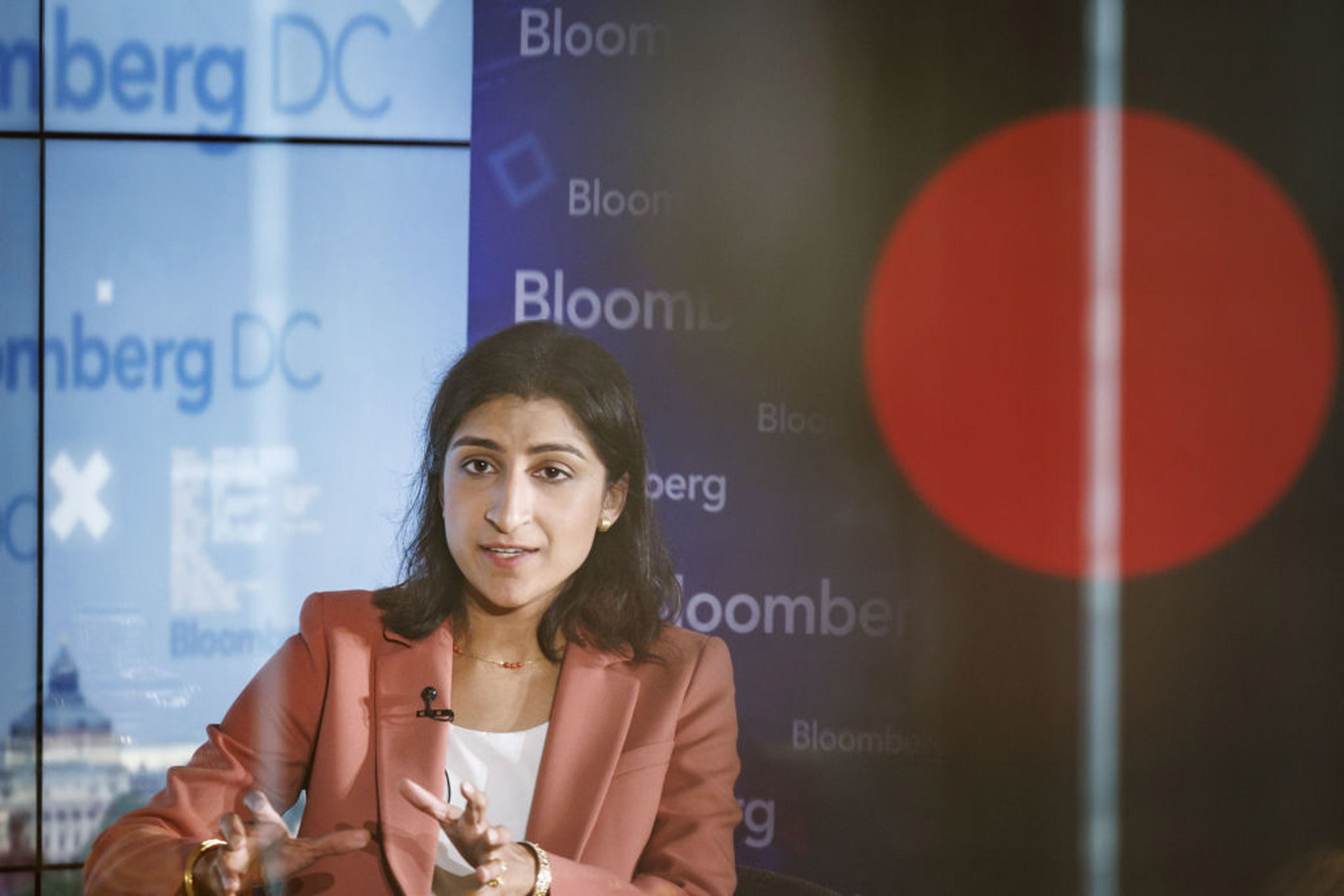
Explains Bietti: “The more you have control over clouds, databases, computing power, eyeballs, and data, the more you’re going to have an advantage on AI. So, it’s really unlikely that we’re going to see many players that are not Big Tech players taking over the world in AI. What we’re going to see a lot is, maybe, many smaller start-ups being acquired by larger Big Tech players. So, then the question of mergers and acquisitions, and making it harder for bigger players to acquire smaller players … becomes really important.
“We’ll see if the FTC and DOJ start successful cases there, and if a potential Trump administration takes them on,” she adds. “But it’s certainly something that is ripe for scrutiny and will determine the next potentially 10 years of tech regulation.”
Can the government keep winning?
Given the victory in the Google search engine case, does Wu believe the government can continue to win? “The advantage that these suits have is that most Americans, including most judges, see a company like Google and don’t really doubt that it’s a monopoly, and don’t doubt that it’s powerful,” he says. “Obviously, it depends on the company, but I think the winds are blowing in a different direction than they were certainly even 10 years ago … [when] a company like Facebook seemed like a new, up-and-coming company.”
Moreover, the business models of networked companies are better understood now, in part because academic research into them is stronger. Prosecutors in the Google search engine trial, for example, relied heavily on experts in behavioral economics who testified against Google’s contention that equipping devices such as iPhones with a particular search engine as its default doesn’t lock consumers into using that engine because users have the ability to switch.
The Google trial included testimony from executives at smaller search engine companies like DuckDuckGo, who said they can’t compete with Google’s market dominance (not every company’s primary product blossoms from a mere noun into full-fledged verb, after all). Indeed, given that Google paid Apple $18 billion in 2021 alone to make Google the default search engine on Apple products, even a fellow behemoth like Microsoft can’t compete, according to testimony by its CEO.

“Google should have seen the antitrust verdict against them coming,” says Bietti, noting that the company will appeal. The DOJ introduced evidence of “a lot of very problematic agreements between Google and Apple as well as other browser and device manufacturers. It was quite clear from the start that these agreements entrenched Google’s default search engine position on approximately 80% of browsers and devices in the U.S., which is extremely problematic from a competition perspective.”
Moreover, she notes, “The judge also made some interesting remarks about Google’s obfuscating and judgment-delaying tactics, stating, for example, that ‘the court is taken aback by the lengths to which Google goes to avoid creating a paper trail for regulators and litigants.’” Remedies will be litigated in a separate trial and could lead to the breakup of Google into different business segments, she explains, adding, “Imagine Gmail separated from Google Maps, Google Search, and YouTube.”
As for the antitrust movement as a whole, Wu is very optimistic. He describes Kanter and Khan, who lead the prosecutions for the DOJ and FTC, respectively, as “very talented and very aggressive. I think they’re there to win. I wouldn’t bet against them.”
Are there downsides to these prosecutions? For one thing, they’re expensive. Wu worries the FTC and DOJ could run out of money, and even though they are independent agencies, Congress has some control of their purse strings.
And what will happen to this litigation if former President Trump is elected this fall? Wu predicts the lawsuits will continue because they have bipartisan support, and he believes Trump has more important priorities than limiting the power of Big Tech, such as immigration.
Today’s antitrust lawsuits offer a peek into the future, according to Tim Wu. “Ten or 15 years from now, we’ll realize it was all about who’s going to control artificial intelligence.”
Bietti disagrees. “If Trump wins, things will change significantly,” she predicts. “For a long time, conservatives, particularly populist conservatives like Trump, sided with the New Brandeisians because they thought it was cool to side with them, and because they wanted to disrupt the economy and fight corrupt powers in the market. But now they’re primarily being elected by certain elite interests.” Coates also thinks the lawsuits will collapse. If someone other than Trump were the Republican presidential nominee, Coates would expect the FTC and DOJ, as independent agencies, to continue the antitrust assault, he says; however, if Trump wins, “I can’t imagine the cases continuing.”
“I can see him sending a memo to the DOJ saying to drop the cases, although that would be an incredibly harmful action,” Coates says. “I have no reason to think he wouldn’t do that … and he would probably brag about it: ‘I made money stopping rule of law.’ I know I sound alarmist, but this is where I am.”
For now, these cases may be winding through the courts in relative obscurity — or at least without the attention that Wu believes they deserve, or that the Microsoft case received decades ago. Yet the stakes are extraordinarily high, for Big Tech and its competitors, of course, but also for the rest of us, who live in a world where the technology these companies create and control increasingly defines the shape of our lives.
